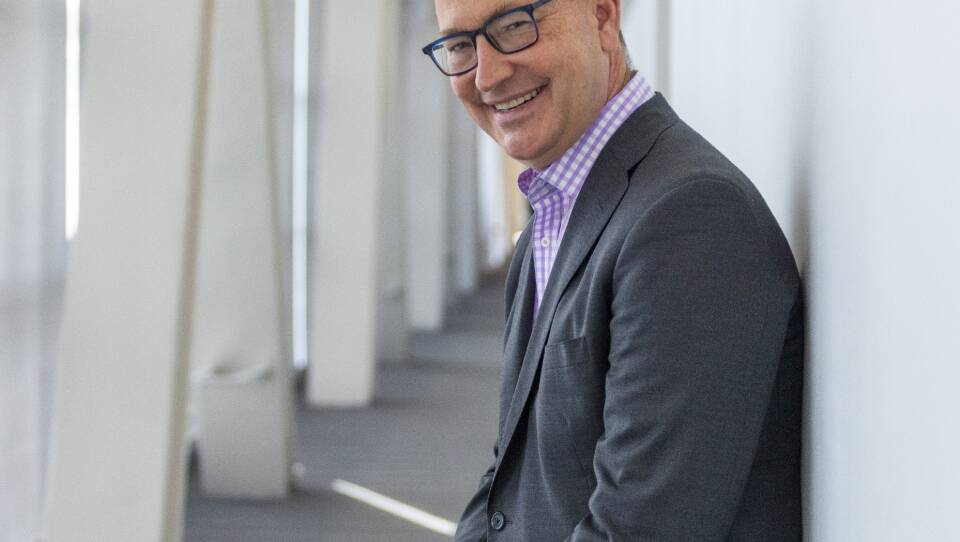Updated 5:45 p.m. Feb. 23
Jon Abbott, president and CEO of GBH, says he will step down by the end of the year after 15 years leading the nation’s largest public broadcaster.
Abbott, who joined GBH in 1998 and became president and CEO in 2007, made the announcement on Wednesday. The 59-year-old plans to stay on through the end of 2022. The organization will soon begin its search for his successor.
Under Abbott, GBH’s endowment grew from over $60 million to more than $520 million. He oversaw the transformation of GBH from a broadcaster of radio and television to a multi-platform digital content creator, and efforts to expand the organization’s diversity in its programming and among its staff.
“We’ve moved to a multimedia, multi-platform environment from broadcasting. We’ve launched 10 [digital] services. We have remarkably talented people across the organization,” Abbott said, “and I feel really, extraordinarily proud and satisfied with where we are. And it feels like a natural time for me to close that chapter and imagine what a new chapter could look like.”
Lee Pelton, president and CEO of the Boston Foundation, and who serves on the GBH Board, said Abbott had helped make GBH “the gold standard by which all public media measure themselves.” He said Abbott’s most significant achievement was shifting from traditional broadcast to digital media.
“There are people who see the future and run from it. And there are people who see the future and run towards it. And he's one of the kind of leaders who runs towards the future,” Pelton said.
His journey began with jazz and college radio
Abbott’s path to public media began with college radio. He grew up in New York City listening to jazz with his father at home and going to jazz clubs. When he became a student at Columbia University in 1980, the school’s noncommercial radio station WKCR played mostly jazz. Early on, Abbott got his own show. He said while broadcasting live shows with famed musicians at New York’s Blue Note Jazz Club, he was struck by the connection between an audience and the artists, and he understood the value of public media.
“Everybody wants to do a show but nobody wants to make sure the transmitter is working or the money’s being raised to make sure it can all happen,” Abbott said, “So I think I came to understand that I could be around all of that and make a difference by creating an environment, a supporting environment for other creative people.”
During Abbott’s tenure, GBH — which produces signature national programs including “Masterpiece,” “FRONTLINE,” “NOVA” and “Antiques Roadshow” — expanded its local news coverage, added podcasts and exclusive online content, and created digital platforms like “World Channel” for documentaries and “Create” for lifestyle content. GBH also grew its roster of kids programming to include “Molly of Denali,” the first national series to feature Native American and Alaska Native lead characters. According to GBH’s most recent data, GBH reaches more than 32 million people nationwide every week, across all its brands and platforms.
Abbott said he’s particularly proud of helping launch PBS LearningMedia, a free online service built in partnership with PBS that offers digital resources for teachers and students. It now has nearly 20 million users nationwide. Abbott said the service saw a jump in audience during the pandemic when many students shifted from in-person to remote learning.
Diversity and work that’s “never done”
On Abbott’s watch, GBH committed to greater diversity both inside the organization and outside, by drawing in more diverse storytellers, an effort that picked up pace after George Floyd’s murder in May 2020.
In the wake of the national outcry and Black Lives Matter protests, many organizations found themselves reflecting on their own racial inequities, including GBH.In July, the organization, which has a public-interest mission to enrich lives “through the power of diverse perspectives,” released data showing 80% of its workforce was white. Since that time, Abbott brought on GBH’s first chief inclusion and equity officer and drove efforts to diversify staff and expand recruiting efforts.
Abbott said the work toward inclusivity is “never done,” and said his successor will need to continue diversifying GBH’s pool of creators to make it clear that GBH “attracts people of all backgrounds, races and economic means … to know they have a place at the table and to feel supported in contributing to public media.”
“I think if we can be an organization that’s seen as committed, energetic and inviting, I think we’ll continue to make progress,” Abbott said.
Alberto Ibarguen, president and CEO of the Knight Foundation, and a former board chair of PBS said given the many skills required, finding Abbott’s successor will be “tough” but the choice is important.
“As the former chair of PBS' board, I can tell you that there are a handful of stations, a small handful of stations in the in the category of WGBH in the entire nation. This is the leadership of public broadcasting in America, and whoever leads that organization matters,” said Ibarguen.
A national search will be conducted to replace Abbott. As for his own plans?
“I don't have an idea what the next chapter is. In some ways, I'm not bothered at all by that,” said Abbott. “There's a joy in being able to think about a clean canvas.”
Editor's note: This article was written and edited by the GBH News staff, with no editorial oversight from GBH executives.
This story was updated to include additional quotes.






